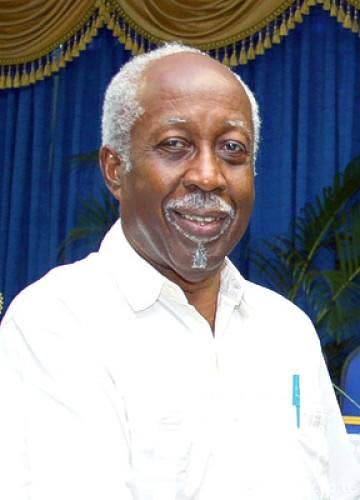Through the dark fog that is the THA’s finances

REGINALD DUMAS
Part II
THE THA’S considerable financial and accounting inadequacies, as documented by the Auditor-General’s Office in its two recent reports on the 2016 financial year, may – probably do – reflect in part an element of bureaucratic slackness. But one would be extremely unwise to dismiss the possibility of other factors. Here are some comparative excerpts from auditor general’s reports on the THA over the years.
Capital expenditure (Development Programme)
2015 – “Supporting source documents were not produced for the verification of expenditure totalling $17,250,000.”
2016 – “Payment vouchers and supporting documents were not produced to verify expenditure totalling $36,911,160.00.”
Investments
2005 – “Authorisation for the write-off of an investment of $12.62 million in ADDA Limited was not seen.”
2016 – “A lease arrangement between the THA and the lessee under which the sum of $323,538,734.70 VAT inclusive is payable over a period of 20 years was not disclosed in the notes to the financial statement.”
Unspent balances
2004 – “Contrary to section 48 of the (THA) Act…the Accumulated Unspent Balances totalling $39,850,403.94 were not retained in the Assembly Fund and reflected on the Balance Sheet.”
2016 – “It was not ascertained whether the unexpended balance of $100,975,000.00 was computed in accordance with (section 48 of the THA Act), and the rationale for the methodology used in the computation was also not determined.”
Bank balances
2015 – “The bank account balances presented…are the actual balances on the bank statements. In most instances the differences between the cash books and the respective bank statements were significant and ranged from ($1,719,523.37) to $20,620,445.61.”
2016 – “The bank account balances represented…were the balances on the bank statements and not the reconciled balances in the cash books…In some instances, significant differences ranging from $157,468,114.64 to negative $1,905,205.38 were seen.”
Contingencies
2005 – “Documents were not produced to support payments totalling $2,573,152.00…made to (CEPEP).”
2006 – “Transactions relating to the (URP) and the Road Improvement Fund were included in these statements contrary to Comptroller of Accounts Circular No. 16 dated 13th November 2006 which require (sic) that separate payments be prepared.”
2016 – “It was not ascertained whether the figures of $31,761,569.00 and $11, 834,798.00 recorded as ‘(URP) Contingencies Account Expenditure’ and ‘Other Contingencies Account Expenditure’ respectively… satisfied the criteria of ‘urgent and unforeseen (expenditure)’ in accordance with section 34[3] of the THA Financial Rules, 1990.”
2016 – “Monies were withdrawn from the Contingencies Fund and in some instances were not used for the purpose of meeting urgent and unforeseen expenditure. Monies withdrawn were used to fund the (URP) and construction of a mall.”
Would public service incompetence alone explain these repeated deficiencies? Do accounting officers have the authority to decide on lease arrangements and mall construction?
Based on their findings, successive auditors general have reached the same conclusion on THA financial statements:
2003 – “I am unable to form an opinion as to whether the…Statements present fairly, in all material respects, the state of affairs of the (THA) and its financial performance and cash flows…”
2016 – “I have not been able to obtain sufficient and appropriate audit evidence to provide a basis for an audit opinion. Accordingly, I do not express an opinion…”
In accounting language, such a conclusion is called a “disclaimer of opinion,” which Accountinguide defines as “usually the most serious type of audit opinion.” So why, when auditor general after auditor general has in essence rejected the offerings of the THA, are these aberrations allowed to continue? Why is taxpayers’ money misused and misallocated with such cynical impunity? Surely not for political reasons?
THA apologists tell us that auditors general have never found any evidence of corruption. You wonder if they’re suggesting that mismanagement, including financial and accounting mismanagement, isn’t so bad after all. But their argument is in any case disingenuous, simply because the auditor general’s audits have been financial, ie, they have focused on whether the THA’s practices and procedures conform with the relevant laws and regulations; they aren’t looking for fraud.
A forensic audit would be needed for that, and the Progressive Democratic Patriots opposition has been advocating one. I’m not there yet. Let me go back to early 2001 and what the newly appointed chief secretary, Orville London, said then. He assured us he would be asking the auditor general “to undertake a comprehensive audit” – also known as a value-for-money audit – “of the finances of the (THA), with special attention to…the (URP)…, consultancy and contractual services…(and) bank accounts…” And if legal action against anyone was found necessary, no problem. Was such an audit ever done?
Separated by two decades, both the PNM and the PDP have seen the cruciality of going beyond the usual financial audits of the THA. So rare a moment of political confluence must be seized.
Parliamentarians? Mr Minister of Finance? Madam Auditor General? How soon will you be taking action? In the country’s interest?


Comments
"Through the dark fog that is the THA’s finances"